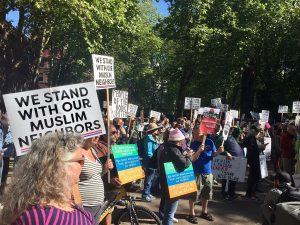
A recent protest in Seattle (by Allison Peryea).
On October 10th and 11th, the Supreme Court will hear oral argument on the Trump Travel Ban. It will be a truly amazing moment in history; the Supreme Court will tell us if we are a country that accepts bigotry against people based on their country of origin, or not. And the fact that we don’t already know the answer to that remains a stunning failure of this Republic.
We’ll have to wait a little longer before we get know if John Roberts will be eligible for a Confederate monument someday, but in the meantime the lower courts continue to roundly reject the notion that President Trump has the authority to codify his arbitrary xenophobia as law. Yesterday, the Ninth Circuit ruled that the Trump’s administration’s definition of “close relatives” was too narrow. So for the moment grandparents — yes, even “Muslim” grandparents living in “bad” countries — can still apply for entry into the United States.

Humans in the Loop: The People Powering Trusted Legal AI
As the use of artificial intelligence permeates legal practice, a critical question confronts every legal professional who uses these tools: Can I trust this?
The Ninth Circuit’s ruling in Hawaii v. Trump is not especially controversial. That people like grandparents count as “close familial relationships” would be wholly unsurprising to anybody who accepted the premise that families who believe in Islam are also “families” in every normal sense of the word. From the per curiam opinion:
From this explanation, it is clear that the Supreme Court’s use of “close familial relationship[s]” meant that the Court wanted to exclude individuals who have no connection with the United States or have remote familial relationships that would not qualify as “bona fide.” The Government does not meaningfully argue how grandparents, grandchildren, brothers-in-law, sisters-in-law, aunts, uncles, nieces, nephews, and cousins of persons in the United States can be considered to have “no connection” to or “lack any bona fide relationship” with persons in the United States. Nor does the Government explain how its proposed scope of exclusion would avoid the infliction of concrete hardships on such individuals’ family members in the United States. Stated simply, the Government does not offer a persuasive explanation for why a mother-in-law is clearly a bona fide relationship, in the Supreme Court’s prior reasoning, but a grandparent, grandchild, aunt, uncle, niece, nephew, or cousin is not.
As usual, the Trump administration has simply done shoddy legal work when writing its rules. Which is a boon to the resistance, because it would be truly terrifying to see what this administration could accomplish with even one above-average lawyer redlining its orders. Team Trump is still under the impression that “executive authority” means the president can issue sweeping proclamations, and let the courts sort out the details. But thus far the lower courts have not been willing to do his work for him.
The circuit courts have been happy to sit back and pop holes in the administration’s pathetic work product, then go home and wait for them to try again. It took the Ninth Circuit all of eleven days between hearing the argument to issuing this decision. People with legal training don’t have to spend a lot of time “wrestling” with the arguments advanced by the current government. They are bad, on their face.

Heading To Legalweek? Come Join Above The Law!
Meet the team in NYC at our Monday night happy hour — 3/9 at 7pm. RSVP required.
But the Supreme Court might be willing to rewrite the Trump travel ban (and other executive orders as they make their way up the flagpole), in such a way as to save the orders and avoid a constitutional confrontation with the executive. As a person who thinks the entire premise behind the Muslim ban is bigoted, unconstitutional, un-American, and immoral, this is my greatest fear. I can absolutely imagine five justices wanting to keep the spirit of bigotry contemplated by this order, who would be willing to do the hard work of re-writing it enough to give it the patina of constitutionality.
So I hope that the Supreme Court is paying attention to what Trump actually does when given the slightest avenue to execute his theories on racial and religious separatism. In June, Chief Justice John Roberts gave Trump the chance to implement parts of his travel ban. But the Court explicitly said that it couldn’t be applied to people with “close familial relationships.” What did Trump do with that inch? He tried to take a mile, and within weeks was banning people’s freaking GRANDPARENTS. That’s how much the Trump administration respects the courts.
Trump couldn’t make it from June 26th to October 10th without turning a “partial victory” into “another constitutional defeat.” Any Court-sponsored version of the travel ban will be immediately re-interpreted as the darkest and most hateful version of itself.
Roberts and Anthony Kennedy will own not only their travel ban opinions, but EVERYTHING that is done thereafter in their names. I hope that they remember that Trump tried to ban grandmas, after the Court told him he couldn’t ban close relatives, before they start writing.
Elie Mystal is an editor of Above the Law and the Legal Editor for More Perfect. He can be reached @ElieNYC on Twitter, or at [email protected]. He will resist.
Earlier:
https://abovethelaw.com/2017/06/did-roberts-show-his-hand-on-the-travel-ban/